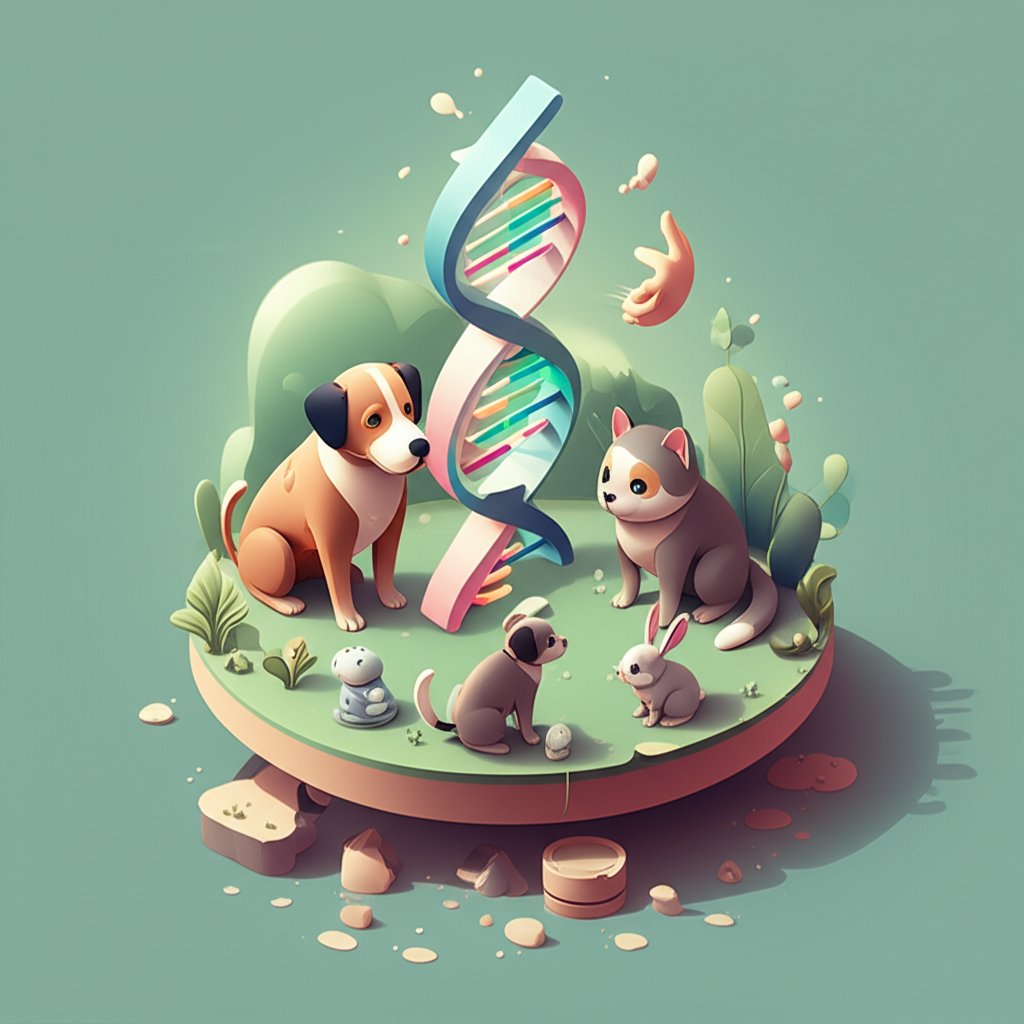Scrolling through social media, you might encounter heartwarming images of animals labeled as having Down syndrome. It’s natural to feel a connection with these unique creatures. However, the truth is more nuanced. While animals don’t experience Down syndrome in the same way humans do, they can have other genetic conditions. The widespread interest in `animals with down syndrome` often stems from misinterpretations of other genetic conditions. Let’s explore the fascinating world of animal genetics and uncover the realities behind these misconceptions, definitively answering the question, `can animals have down syndrome`?
Decoding Down Syndrome
Down syndrome is a genetic condition specific to humans, caused by trisomy 21—an extra copy of chromosome 21. Think of chromosomes as instruction manuals for our bodies; an extra copy of this specific manual disrupts development, leading to various physical and intellectual characteristics. Can snails swim? Surprisingly, this specific genetic anomaly doesn’t occur in other species.
Down Syndrome in Humans
In humans, Down syndrome results from this trisomy 21, where an individual has three copies of chromosome 21 instead of the usual two. This genetic difference impacts physical and cognitive development.
Animals and Chromosomal Differences
Animals have different chromosomal arrangements than humans. They possess varying numbers of chromosomes, organized in unique ways, making human trisomy 21 impossible in other species. A dog, for instance, has 78 chromosomes compared to a human’s 46 (which are organized into 23 pairs). A cat, in contrast, has 38 chromosomes (19 pairs). This inherent difference in genetic makeup precludes the possibility of Down syndrome in animals.
Dispelling Myths: Kenny the Tiger and Internet Misconceptions

The Case of Kenny the White Tiger
Kenny the white tiger’s flattened face and cognitive difficulties were often mistakenly attributed to Down syndrome. However, Kenny’s condition likely resulted from inbreeding, a practice that increases the likelihood of genetic problems across numerous species. This highlights how appearances reminiscent of `down syndrome animals` can have vastly different underlying causes.
Viral Photos and Misinterpretations
Images of cats labeled as having Down syndrome circulate online. While these cats might share some physical or behavioral similarities with humans who have Down syndrome, their genetics tell a different story. These traits likely stem from genetic mutations, congenital disabilities, or developmental environmental factors. Similar outward signs don’t guarantee identical underlying causes. It’s crucial to differentiate anecdotal reports from scientific evidence when evaluating claims about `animals with down syndrome`.
Understanding Varied Appearances: Beyond Down Syndrome
The internet is replete with images of `down syndrome animals`, from dogs with unusual facial structures to cats with distinctive eye shapes, or even lions with flatter faces. These often lead to misinterpretations. While captivating, these unique characteristics are rarely, if ever, indicative of Down syndrome. Instead, they can be manifestations of diverse genetic mutations, specific health problems, or simply natural variations within a species. For instance, some breeds are predisposed to certain facial structures, which might be perceived as different but are simply part of their breed standard or a result of selective breeding.
Animals’ Role in Down Syndrome Research
While animals can’t get Down syndrome, they contribute significantly to its research. Genetically modified mice with altered genes related to the human chromosome 21 offer a model system for studying the condition and exploring potential treatments. This research provides valuable insights into Down syndrome and aids in developing therapies for humans. Promising research involving `Down syndrome in mice` models has shown potential for understanding and even reversing some aspects of the condition, offering hope for future human therapies.
The Science of Similar Traits
Why do some animals exhibit characteristics reminiscent of Down syndrome? Variations in genes governing development across species can lead to comparable outward appearances, even without trisomy 21. A gene mutation unrelated to chromosome 21 could still produce similar physical or developmental outcomes. It’s crucial to remember that similar appearances don’t necessitate identical genetic underpinnings. This is why recognizing that even `animals with down syndrome`-like traits are experiencing distinct conditions is vital. Ongoing research continues to unravel the complexities of genetics and development, promising to refine our understanding of genetic conditions across species.
Can a dog have Down syndrome?

The simple answer is no. Down syndrome is unique to humans due to the trisomy 21 mechanism. Dogs have a different chromosomal structure (78 chromosomes) preventing them from developing this condition. However, dogs can experience other genetic conditions causing similar physical traits and developmental delays. So, while you might observe traits in a dog that lead you to ask, `can animals have down syndrome?`, the answer for dogs specifically remains no.
Genetic Conditions in Dogs Resembling Down Syndrome
Conditions like congenital hypothyroidism, pituitary dwarfism, hydrocephalus, and portosystemic shunts can cause symptoms similar to Down syndrome, such as developmental delays, distinct facial features, and stunted growth. These conditions are distinct from Down syndrome but may present comparable observable traits.
Importance of Veterinary Diagnosis
If your dog displays symptoms resembling Down syndrome, consulting a veterinarian is crucial for proper diagnosis and tailored care. Diagnostic tests like genetic testing, blood work, and imaging scans can identify the underlying cause.
Can chimps have Down syndrome?
Chimpanzees cannot develop Down syndrome (trisomy 21) due to their differing genetic structure. They can, however, develop a similar but distinct condition called trisomy 22, involving their 22nd chromosome—the equivalent of the human 21st chromosome. This is one of the closest examples of a primate condition mirroring Down syndrome, though it is not the same.
Trisomy 22 in Chimps
Trisomy 22 is exceedingly rare in chimpanzees, with only two confirmed cases documented. Kanako, a female chimpanzee, is a notable example, living to 24 years old. Limited cases make research challenging, but Kanako’s case offered valuable insights.
Comparing Trisomy 22 and Down Syndrome
While both conditions might present developmental delays and some similar physical characteristics, they remain distinct due to their different genetic basis. Further research on trisomy 22 could unravel complexities in genetic disorders, potentially informing therapeutic strategies.
Can a cat have Down syndrome?
Cats, like other animals, cannot develop Down syndrome. Their 19 chromosome pairs (38 chromosomes total) lack an equivalent to the human chromosome 21, responsible for Down syndrome. However, several other factors can cause similar traits.
Potential Causes of Similar Traits in Cats
Genetic mutations, congenital defects, prenatal infections, injuries, or metabolic disorders can lead to physical and behavioral traits in cats that resemble some aspects of Down syndrome.
The Importance of Veterinary Care
If your cat displays unusual traits, consult a veterinarian. Proper diagnosis is crucial to determine the actual cause and provide appropriate care.
It’s important to remember that our understanding of genetics constantly evolves with ongoing research. While animals cannot have Down syndrome in the human sense, they can experience other genetic conditions with potentially similar manifestations. Consulting a veterinarian is essential for proper diagnosis and tailored care. By understanding the nuances of genetics across species, we can better appreciate the diversity and complexities of the animal kingdom. The ongoing fascination with `down syndrome animals` underscores the need for accurate information and responsible pet ownership, including ethical breeding practices crucial for animal well-being.











1 thought on “Can Animals Get Down Syndrome? Separating Fact from Fiction”
Comments are closed.